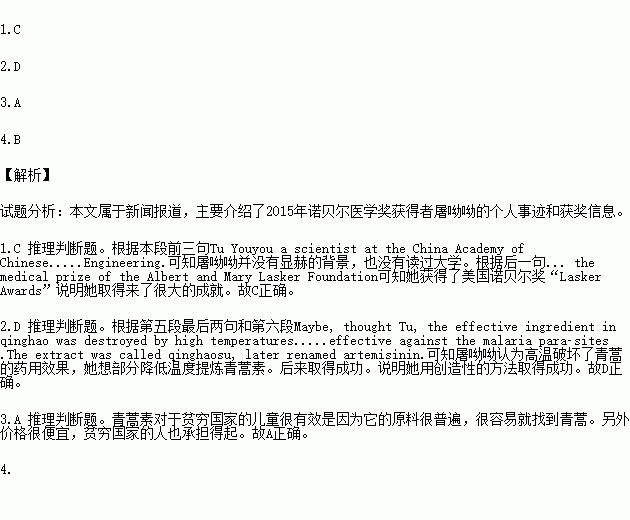题目内容
Ireland,Japan,China scientists share the 2015 Nobel Prize for medicine.William Campbell,Satoshi Omura and Tu Youyou jointly won the prize for their work against diseases,the award-giving body said on Monday.
Tu Youyou, a scientist at the China Academy of Chinese Medical Sciences, has no postgraduate degree. She has never studied or done research abroad. She is neither a member of the Chinese Academy of Sciences nor the Chinese Academy of Engineering. However, the 81-year-old pharmacologist has become the first scientist on the Chinese mainland to win a Lasker Award, the medical prize of the Albert and Mary Lasker Foundation.
The Lasker Awards have existed since 1945. Tu was presented the 2011 Lasker Clinical Medical Research Award on September 23. She discovered a drug called artemisinin . The drug is now widely used against malaria .
Tu and her colleagues joined a government project to find a new malaria drug in the late 1960s during the "cultural revolution" (1966-76). They made 380 herbal extracts from 200 potential recipes. The recipes came from traditional Chinese medical books. The team then tested them on malaria-infected mice. Finally Tu became interested in an extract of the plant qinghao, or sweet wormwood .
According to an ancient Chinese medicine book, qinghao was once used to treat malaria. However, the extract they made in the lab didn't work well. Maybe, thought Tu, the effective ingredient in qinghao was destroyed by high temperatures. Therefore, Tu tried to make the extract with an ether which has a much lower boiling point than water.
In 1971, after more than 190 failures, Tu finally got an extract that was 100 percent effective against the malaria parasites .The extract was called qinghaosu, later renamed artemisinin.
According to a statement on the Lasker Foundation website, during the past four decades, Tu's drug has saved millions of lives. It is especially important for children in the poorest and least developed parts of the world. However, not many people knew of the scientist until she won the Lasker Award this month.
Lasker Awards are known as "America's Nobels" for the reason that in the last two decades, 28 Lasker Prize winners have gone on to receive the Nobel Prize, and 80 since 1945, according to Xinhua News Agency.
" The discovery of artemisinin is a gift to mankind from traditional Chinese medicine," Tu said when she received the a-ward. "Continuous exploration and development of traditional medicine will, without doubt, bring more medicines to the world.
1.What can we infer from the second paragraph?
A. It is unnecessary to study abroad as a scientific researcher.
B. Chinese medicine used not to be recognized in Western countries.
C. Tu achieved great things although she didn't have an impressive background.
D. Tu is the first female scientist to win a Lasker Award.
2.In the process of discovering artemisinin, Tu _________.
A. began with a private project
B. succeeded during the first experiments
C. faced many different opinions
D. made extracts in a creative way
3.Why is artemisinin especially important for children from poor countries?
A. It is a very cheap medicine and easy for them to get hold of.
B. They believe in the effect of Chinese medicine.
C. There are no other cures for malaria.
D. It has the fewest side effects for children.
4.According to the article, the Lasker Awards _________.
A. are more influential than Nobel Prizes in the medical field
B. are awarded to those who have made great medical achievements
C. are awarded to more Americans than people from any other country
D. are usually awarded to scientists who are not famous in their field

